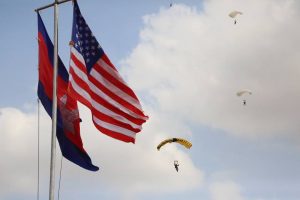Earlier this month, the Cambodian government announced that it was suspending its two-week military exercise with China next month, citing a need to cut spending amid the COVID-19 pandemic.
The Golden Dragon exercise was due to take place from March 13 to 27, and would have involved around 3,000 Cambodian and Chinese troops engaging in live ammunition drills, including training on the use of tanks, armored vehicles, and demining equipment.
In comments to Radio Free Asia’s Khmer-language service, Cambodian Defense Minister Tea Banh said that the fourth annual Golden Dragon exercise would be canceled this year due to heavy flooding in late 2020 that devastated the country’s infrastructure and food supply. He also pointed to the country’s ongoing battle with COVID-19 and “several other problems” facing the government.
“We are dealing with these difficulties. [The flooding] severely affected the well-being and livelihood of the people and is expected to result in more poverty and hardship,” Tea Banh told RFA Khmer. “So, based on this, we have suspended the military exercise.”
Interestingly, the suspension bears a close resemblance to the cancellation of a similar military exercise with the United States in 2017. The Angkor Sentinel joint exercise was first held in 2010, and was unexpectedly called off by the Cambodian government in January 2017. Just a few weeks earlier, in December 2016, Cambodian troops had taken part in the the first Golden Dragon military exercise with China’s People’s Liberation Army.
The cancellation of Angkor Sentinel marked an important marker in the declining U.S.-Cambodian relationship. In September of the same year, government arrested Kem Sokha, the president of the Cambodia National Rescue Party (CNRP), two months before it banned the party outright. Both moves were criticized strongly by the U.S. and other Western governments, as was the farcical national election in July 2018, when the ruling Cambodian Peoples’ Party (CPP) won all 125 seats in the National Assembly.
As Prime Minister Hun Sen’s crackdown alienated his government from the Western democracies, he leaned ever more heavily on support from China. As reports and rumors emerged that Cambodia was preparing to host a Chinese military presence, Cambodia popped up on the radar of an increasingly hawkish U.S. foreign policy establishment that was now inclined to view Hun Sen’s government as a Chinese client state – and to treat it accordingly.
In this context, there is a possibility that the cancellation of the Golden Dragon exercise was intended as a subtle signal to the new U.S. administration that the Cambodian government is no mere lackey of Beijing, and that it is ready for a reset in its relations with Washington. Such would certainly be Hun Sen’s interests, given his current heavy reliance on China, and the risk that the country will be once again find itself a subject of superpower tensions.
While this may seem to be reading too much into the Cambodian government’s explanation for the suspension of Golden Dragon, it is worth pointing out that the government offered a similar excuse for the cancellation of military exercises with the U.S. in 2017. At the time, a Defense Ministry spokesperson said that the country was busy preparing for local elections in June 2017, but the exercises have never been held since.
Whatever the reality of the situation, any improvement in relations will require one of two things: either Hun Sen’s government will have to make the democratic reforms necessary to satisfy the U.S. and other Western governments, or the U.S. government will have to adopt a more pragmatic approach to Cambodia.
The first is unlikely, given Hun Sen’s reluctant to anything that puts the CPP’s power in jeopardy. Meanwhile, the Biden administration is unlikely to take a significantly softer line on human rights and democracy promotion efforts in Cambodia. Indeed, if anything, as Washington compromises on values in Southeast Asia in a bid to build partnerships in the interests of curbing Chinese ambitions, Cambodia’s status as a subject of democracy promotion efforts is only likely to grow.

































